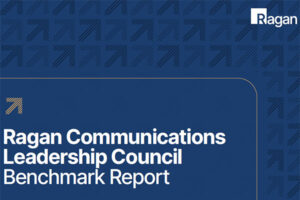Why and how companies should prioritize ESG reporting
Companies should anticipate more scrutiny from regulators, investors and employees in 2022. Here’s what to consider when compiling and filing sustainability disclosures.

Pursuing ethical business practices is not just the right thing to do.
Increasingly, companies are being compelled to disclose their impact on the climate and report on other issues pertaining to sustainability, equality and governance. Despite these external pressures—and growing internal calls for accountability—a new report from The Conference Board in collaboration with Heidrick & Struggles and the data firm, ESGAUGE, finds that smaller and mid-size companies are struggling to keep up.
That lack of ESG accountability could spell trouble for companies that are keen to improve their reputation and prevent a PR crisis due to negligence or bad behavior. But it’s a vacuum that also presents rich opportunities for communicators who are bold enough to claim new territory.
Mind the ESG gaps
The Conference Board’s study examines corporate disclosure and performance data of U.S. publicly traded companies. The report is accompanied by an online dashboard to analyze and create reports on the data by index, sector and company size, which is a helpful tool to benchmark your own efforts and initiatives.
Another good starting point for communicators is sussing out where other companies are focusing their efforts and energy—and identifying where they’re coming up short.
According to the report:
1. Diversity proposals skyrocket.
Almost four times as many shareholder proposals were filed on board and workplace diversity in 2021, compared with 2020. This dovetails with Nasdaq’s new requirements for board diversity and increasing pressure to deliver on DE&I promises made after the racial reckonings of 2020.
Furthermore, The Conference Board finds:
- Companies, both large and small, should expect a continued push by shareholders on diversity, particularly as disclosure data reveal some notable gaps in the representation of women and minorities in leadership positions.
- Financial and health care companies have majority-women workforces, but in both sectors, women account for just over one-third of management positions. These two sectors also have some of the lowest percentages of women on boards.
- Few companies report the number of minorities in management positions. Among those that do, minorities represent less than one in four management positions at both Russell 3000 and S&P 500 companies.
2. Smaller companies must ramp up external assurance and accountability.
Larger companies verify their sustainability information through external assurance at six times the rate of smaller companies.
The Conference Board explains the importance of this oversight: “CEOs and their management teams should anticipate that investors, lenders, credit rating agencies, ESG ranking firms, business partners, and regulators will increasingly expect assurance. Firms that begin to phase in assurance now can do so more strategically and efficiently than if they wait for regulatory mandates.”
3. Biodiversity and deforestation reporting is lacking.
Investors are seeking more information on companies’ policies on biodiversity and deforestation. However, these policies are rare: 15% of S&P 500 companies and 5% of Russell 3000 companies have biodiversity policies in place. Companies should assess how their supply chain can affect, or be affected by, biodiversity loss and deforestation. You might also consider adding specific biodiversity and deforestation initiatives to your philanthropy strategies to bolster your credibility.
Reporting on greenhouse gas emissions is also not great. The report finds:
- Among smaller and mid-size companies, only 28% disclose their greenhouse gas emissions.
- Companies should be prepared to address their impact on climate and the climate’s impact on the business.
4. Neglecting water disclosure.
The report finds:
- Just 12% of S&P 500 companies, 6% of S&P MidCap 400 companies, and 4% of Russell 3000 companies disclose the amount of water withdrawn from water-stressed areas.
- Even industries that are highly exposed to water risks do not consistently provide relevant information on water use or conservation efforts.
Does your company have any glaring ESG weaknesses or gaps in oversight or reporting? If so, now would be a good time to take the bull by the horns. As noted by Thomas Singer, principal researcher at The Conference Board ESG Center and the report’s lead author, these issues are now inextricably tied to reputation: “More and more, these disclosures are expected by key stakeholders who can influence the company’s reputation and bottom line. Smaller companies that have not yet prepared climate disclosures will inevitably face greater pressure to do so, not least because the SEC is expected to propose rules on climate disclosure early this year.”
Jeremy Hanson, a partner in the global CEO & Board of Directors Practice and co-lead of the global Sustainability Office at Heidrick & Struggles, distills how essential ESG reporting will be moving forward:
“We also expect to see more emphasis on disclosure and measurement as ESG reporting and metrics affect the terms on which a company can access capital in the future. Going forward, the ability to show concrete results and precise data, while also being clear on where a company stands in addressing sustainability issues, is going to be a duty for every board, CEO, and organization, regardless of size or sector.”







